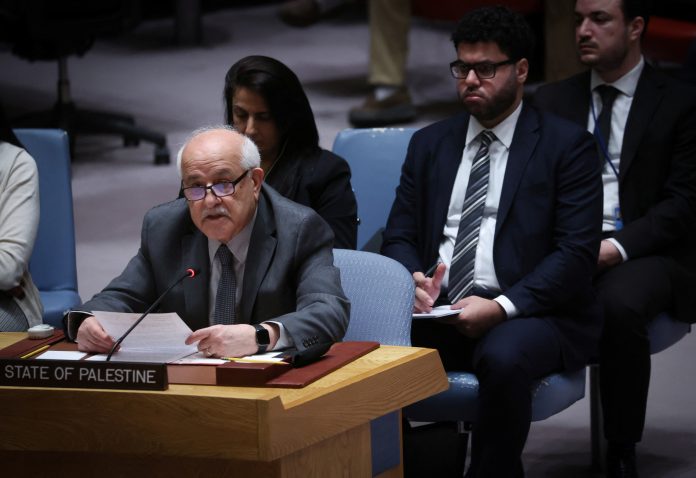The US on Tuesday (20 February) vetoed a widely supported UN resolution demanding an immediate humanitarian end to the war in Gaza.
The vote in the 15-member Security Council was 13-1 with Britain abstaining, reflecting strong support from countries around the world for ending the latest outbreak of war in the 76-year-old Israeli-Palestinian conflict.
It was the third US veto of a Security Council resolution demanding a cease-fire in Gaza, and came a day after the US circulated a competing resolution that would have supported a temporary cease-fire tied to the release of all hostages.
Virtually every Council member expressed concern about a looming disaster in the southern city of Rafah, where some 1.5 million Palestinians have taken refuge, if Israeli Prime Minister Benjamin Netanyahu goes ahead with his plan to evacuate civilians and shift Israel’s military offensive to territory bordering Egypt, where Israel believes Hamas militants are hiding.
Before the vote, Algeria’s UN Ambassador Amar Bendjama, the Arab representative on the council, said:
“A vote in favor of this draft resolution is a support to the Palestinians right to life. Conversely, voting against it implies an endorsement of the brutal violence and collective punishment inflicted against them.”
US Ambassador Linda Thomas-Greenfield responded that the United States understood the desire for urgent action, but believed the resolution would “negatively impact” sensitive negotiations on a hostage deal and a pause in fighting for at least six weeks. If that happens, “we can spend the time building a more lasting peace,” she said.
She said the US-proposed resolution “will do what this text does not – put pressure on Hamas to accept the hostage deal that is on the table and help ensure a pause that will allow humanitarian aid to reach Palestinian civilians who desperately need it.”
Israel’s UN Ambassador Gilad Erdan said the word “ceasefire” was being used in the Security Council, General Assembly and UN officials “as if it were a silver bullet, a magic solution to all the problems of the region.”
He called it an “absurd notion,” warning that a ceasefire in Gaza would allow Hamas to rearm and regroup, and stressed that “their next attempt at genocide against Israelis will only be a matter of ‘when’ and not ‘if’.”
Riyad Mansour, the Palestinian ambassador to the UN, said in response that “the veto imposed on Israel today means that it will continue to get away with murder.”
He warned that more babies would be killed and orphaned, more children would die of hunger, cold and disease, more families would be threatened with further displacement, and all 2.3 million Gazans would be left without food, water, medicine or shelter.
The 22-member Arab Group can refer its resolution to the UN General Assembly, which includes all 193 UN member states, where it will almost certainly be approved. But unlike Security Council resolutions, Assembly resolutions are not legally binding.
The Arab-backed resolution would have demanded an immediate humanitarian ceasefire to be respected by all parties, which implies an end to the war.
In contrast, the US draft resolution supports a temporary ceasefire “as soon as possible, based on a formula for the release of all hostages” and calls for “the removal of all barriers to humanitarian assistance on a large scale.”
While this was the third US veto of a Security Council resolution demanding an immediate ceasefire, the Council passed two resolutions on Gaza in which the US abstained.
The first resolution, adopted on 15 November, called for a humanitarian pause to address the worsening crisis for Palestinian civilians. In late November, a seven-day pause led to the release of 120 hostages held by Hamas in exchange for Israel’s release of 200 Palestinian prisoners.
On 22 December, the council adopted a softened resolution calling for an immediate acceleration of aid to desperate Gaza civilians, but without the original call for an “urgent cessation of hostilities” between Israel and Hamas.
But it did call for “creating conditions for a sustained cessation of hostilities.” The steps were not specified, but diplomats said it was the council’s first mention of a cessation of hostilities. Because of the ongoing fighting and the lack of a new humanitarian pause, little aid is reaching Gaza.
More than 29,000 Palestinians have been killed in Israeli airstrikes on the Gaza Strip since the 7 October attack, when militants from Hamas’ military wing invaded southern Israel, killing some 1,200 people and taking another 240 hostages.
